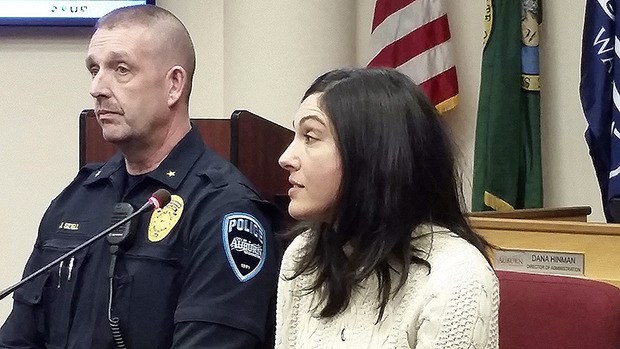Without gyms, pools or exercise equipment, the YMCA’s Alive & Free program for youth in gangs and who are caught up in the criminal justice system is a far cry from what people usually have in mind when they think of the Y.
But it is no less vital for that.
In 2015, the YMCA’s Alive & Free outreach program in South King County served 60 youngsters in Auburn. In so doing, the program, which the Metrocenter Branch of the YMCA of Greater Seattle launched in 2012, connected half of those kids to services like education, employment, internships and drug and alcohol counseling.
The other 50 percent, Jovi Catena, director of the Alive & Free program, informed members of the Auburn City Council on Jan. 25 at City Hall, is still working with an outreach worker.
“Sometimes it can take quite a long time for a young person to change, but we stay with them as they work their change process, and their outreach worker helps guide them to meet their goals and overcome their barriers,” Catena said.
Although the program partners directly with the City of Seattle, since 2012 it has forged partnerships with the cities of Auburn, Kent, Renton and Tukwila.
Jovi noted that while Auburn has one outreach worker who is dedicated to working with young people, that person acts in partnership with other teams of outreach workers and with the Auburn School District and criminal justice system.
Jovi said Alive & Free works with King County Juvenile Court to run a three-run program that’s all about preventing youth from becoming the subjects of warrants for their arrest. This program, in partnership with a federal grant, is aimed at young people who may live at some distance from court or who may not even know they have a court date, perhaps because their letter was sent to their former address.
“We go out and locate the young people and let them know that they have a court date,” Jovi said. “We also support them and their family through that process, including arranging transportation for them. Young people in 2015 who participated in that program … have one-quarter fewer warrants than kids who did not. We have a treatment group and a non-treatment group because it’s an evaluative project. We’re really proud of our ability to help young people stay out of detainment.”
Alive & Free has a Memorandum of Understanding with the Auburn School District that allows it to find young people at school.
“A lot of times when we are looking for a young person, that’s the first place we’ll try,” Jovi said. “Other times kids are truant, but working with schools has allowed us to receive referrals directly from concerned principals, or counselors, or teachers who have young people whom they believe are involved in gangs or violence, and they want some support in helping that young person.”
Auburn Police Commander Jamie Sidell said the programs and services Alive & Free offers appeal to police.
“It’s long term and it’s ongoing; it’s not just a service-type program,” Sidell said. “Kids from Auburn, for example, who go to Renton, the services … go with that person. They don’t have to be reintroduced to a whole other set of services. That is very appealing to us because during that same process the outreach workers and the team involve the youth’s parents and guardians as well. It’s a holistic approach to get to the root cause of what’s going on.”
David Lujano was involved in gang related activity in his youth, which finally put him in jail. Today, Lujano has put his life on track. Having begun as an outreach worker with the Alive & Free program at its inception, he is today the supervisor for the program in South King County.
“At first, as with any youth program, a lot of people had a lot of questions, but I think that we are rooted enough to prove that our program helps young people to move along in life and to stay in school,” Lujano said. “… We have identified a lot of youth in Auburn that are involved in gangs, some of them in Hispanic gangs and other cultures. So, being on the streets and being present and being consistent with the kids in trying to get them to resources has given us the chance to build up a good rapport with them.
“Now, we can actually walk onto any street and be recognized by them and be respected for the work that we do, because they know that we are there just to help. Even the hard ones that don’t want to talk to you, eventually they give in because they have seen friends moving along,” Lujano said.


